| Srl | Item |
| 1 |
ID:
109810
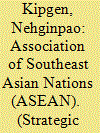

|
|
|
|
|
| Publication |
2012.
|
| Summary/Abstract |
Though the original focus of the Association of Southeast Asian Nations (ASEAN) was primarily economic cooperation, the adoption of the ASEAN charter in November 2007 officially included cooperation on human rights. This article examines three hypotheses to determine the causes of cooperation problems: regime type, non-interference policy, and absence of an enforcement mechanism in the ASEAN charter. The article argues that regime type is important but it is neither a necessary nor a sufficient condition; the non-interference policy is necessary but not sufficient; and it is the absence of an enforcement mechanism in the ASEAN charter that causes cooperation problems on human rights.
|
|
|
|
|
|
|
|
|
|
|
|
|
|
|
|
| 2 |
ID:
109807
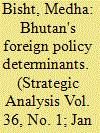

|
|
|
|
|
| Publication |
2012.
|
| Summary/Abstract |
This article assesses the shifting preferences of Bhutan towards the foreign policy determinants. Three determinants (national security, political culture and economic engagement) have been studied as they play a significant role in shaping Bhutan's policy behaviour. These determinants have been analysed with respect to India, Nepal and China, three countries that have been of critical interest to Bhutan's foreign policy. The main argument of the paper is that when security threats are high or medium, protecting territorial integrity, sovereignty and political culture shapes Bhutan's foreign policy and, alternatively, when security threats are low, economic opportunities determine Bhutan's foreign policy choices.
|
|
|
|
|
|
|
|
|
|
|
|
|
|
|
|
| 3 |
ID:
109799


|
|
|
|
|
| Publication |
2012.
|
| Summary/Abstract |
China is gradually increasing its economic and commercial presence in Eastern Europe by signing bilateral agreements with countries that are still in transition, some of which are members of the European Union (EU).
|
|
|
|
|
|
|
|
|
|
|
|
|
|
|
|
| 4 |
ID:
109805
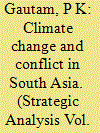

|
|
|
|
|
| Publication |
2012.
|
| Summary/Abstract |
It is now commonly accepted that small island countries are facing an existential threat because of global warming and the consequent rise in the level of the oceans.
|
|
|
|
|
|
|
|
|
|
|
|
|
|
|
|
| 5 |
ID:
109804
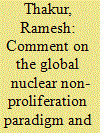

|
|
|
|
|
| Publication |
2012.
|
| Summary/Abstract |
Rajiv Nayan's article is both important and interesting. It is important because nuclear weapons pose a threat to humanity and the planet that in magnitude, severity and immediacy is the gravest of all known risks confronting us today.
|
|
|
|
|
|
|
|
|
|
|
|
|
|
|
|
| 6 |
ID:
109813
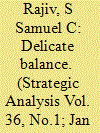

|
|
|
|
|
| Publication |
2012.
|
| Summary/Abstract |
India's foreign policy interactions with Israel are marked by a political discreetness which is in contrast to its prominent political engagement with the Palestinians and countries of the Arab world. India plays down its robust defence engagement with Israel, censures Israeli policies regarding the Palestinians, supports Palestinian-related resolutions at multi-lateral forums like the UN, differs strongly from Israeli policy on issues such as Iran's nuclear programme while being opposed to the possibility of Iran acquiring nuclear weapons capability. This policy has expanded the space for India to pursue its foreign policy and national interest goals, as attested to by the robust political and economic interaction with the Palestinians and the Arab countries, and rising defence and economic engagement with Israel despite certain domestic constituencies opposed to such a partnership. However, the limitations of such a policy include the minimal role that India has been able to play in the Middle East peace process, 'diplomatic heartburn' of an ally deeply involved in the security sphere-as is evident in the Israeli reaction to the Indian stance on the Goldstone report, for instance-and limited 'comfort zones' if crisis situations arise. Greater political engagement could be a bulwark against such tendencies and also provide important opportunities to convey India's concerns regarding the Palestinians more forcefully.
|
|
|
|
|
|
|
|
|
|
|
|
|
|
|
|
| 7 |
ID:
109809
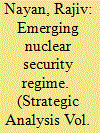

|
|
|
|
|
| Publication |
2012.
|
| Summary/Abstract |
Several measures are being initiated by the international community to secure sensitive materials. Al Qaeda's open interest in acquiring nuclear weapons and the rise of terrorist activity in nuclear-armed Pakistan have triggered a global interest in the need to secure nuclear weapons and materials. In April 2010 President Obama invited some key countries and international organisations in Washington to frame a new regime for nuclear security. The emerging regime includes some older initiatives as well as some new mechanisms, and it must address a number of issues. These range from defining nuclear security threats to finding the right kind of institution promoting nuclear security. The enthusiasm for the 2012 Nuclear Security Summit will depend on how the participating countries and the international community deal with these challenges.
|
|
|
|
|
|
|
|
|
|
|
|
|
|
|
|
| 8 |
ID:
109806


|
|
|
|
|
| Publication |
2012.
|
| Summary/Abstract |
China is a thirsty country desperately in need of water-a lot of it. In order to meet its water and energy requirements in the densely populated and fertile northern plains, it is successively making interventions in the Tibetan rivers in the southern part through dams and diversions. While China is well within its riparian rights to do so, a set of externalities involving the principles of water-sharing and lower riparian needs-stretching from Afghanistan to Vietnam-raise concerns. Politically controlling Tibet and thereby having control over the mighty rivers that originate there allows Beijing to overcome its uneven water distribution but also importantly gives its leaders strategic width and diplomatic clout for dealing with its neighbours. Based on the theoretical framework of power and hydro-hegemony this article examines how China's hydro-behaviour on the Brahmaputra (Yarlung Ysangpo) could impact power relations with India and what India's counter-hydro-hegemony strategy should be.
|
|
|
|
|
|
|
|
|
|
|
|
|
|
|
|
| 9 |
ID:
109793
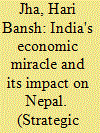

|
|
|
| 10 |
ID:
109795


|
|
|
| 11 |
ID:
109808


|
|
|
|
|
| Publication |
2012.
|
| Summary/Abstract |
India has been grappling with the problem of devising an efficient border management strategy that would prevent the entry of dangerous elements while at the same time allowing the legitimate flow of goods, services and people. Given that it has always been vulnerable to cross-border threats and challenges such as illegal migration, drug and human trafficking, gunrunning, smuggling of commodities and cross-border terrorism, India has taken a largely unilateral approach towards border management whereby security of the borders is accorded primacy over the free movement of people and goods. However, as the Indian economy is growing and fast integrating itself with the economies of the region, there is a consequent increase in trade and cross-border flow of people. It has to jettison its unilateral approach towards border management and adopt a cooperative approach along the lines of the 'smart border' approach of the United States.
|
|
|
|
|
|
|
|
|
|
|
|
|
|
|
|
| 12 |
ID:
109791
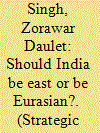

|
|
|
| 13 |
ID:
109802
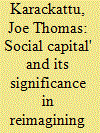

|
|
|
|
|
| Publication |
2011.
|
| Summary/Abstract |
Writings on India-China relations in recent years are increasingly seen to be imputing Machiavellian realism to the political and, increasingly, economic sphere of interaction.
|
|
|
|
|
|
|
|
|
|
|
|
|
|
|
|
| 14 |
ID:
109815


|
|
|
|
|
| Publication |
2012.
|
| Summary/Abstract |
The oil-rich Middle East region is always seen as a politically volatile region, but it has been the source of crude oil supply to all major consumers worldwide for decades. The article makes an empirical analysis of the geopolitical risk of India's diversification portfolio, which is skewed towards the Middle East. The article attempts to forecast the Geopolitical Market Concentration (GMC) risk of India's crude oil diversification portfolio in the worst and best case scenarios by forecasting and by a substitution of selection parameters of the existing William Blyth and Nicolas Lefèvre GMC risk model (2004). For the forecast, the article takes into account, the 'suppliers concentration' and the 'political stability' of the countries supplying crude oil to India. The research uses the Holt-Winters method of trend fitting and forecasting of the time series data of the variables. It also forecasts the GMC risk of an alternative diversification portfolio, based on a hypothetical situation where there is a complete stoppage of supply of crude oil from the Middle East region. This empirical research will help us to consolidate or contradict whether 'the Middle East is risky' by making a comparative case-by-case analysis of sourcing from other regions in the present and future worst and best case political risk ratings as provided by International Country Risk Guide (ICRG) along with other factors such as proved reserves, reserves to production ratio (R/P), geographical proximity, etc.
|
|
|
|
|
|
|
|
|
|
|
|
|
|
|
|
| 15 |
ID:
109812
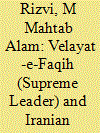

|
|
|
|
|
| Publication |
2012.
|
| Summary/Abstract |
There has been an increasing assertion of the velayat-e-faqih in Iranian politics in recent years. This has led to tensions between them and the presidential office in Iran. Against this backdrop, this article seeks to analyse the constitutional position of the velayat-e-faqih and how it has interacted with other institutions to shape Iranian foreign policy. The article critically analyses the relationship between the velayat-e-faqih and different popularly elected presidents. It concludes that this institution has been able to determine the course of Iranian foreign policy so far and will play an important role in its formulation in the future.
|
|
|
|
|
|
|
|
|
|
|
|
|
|
|
|